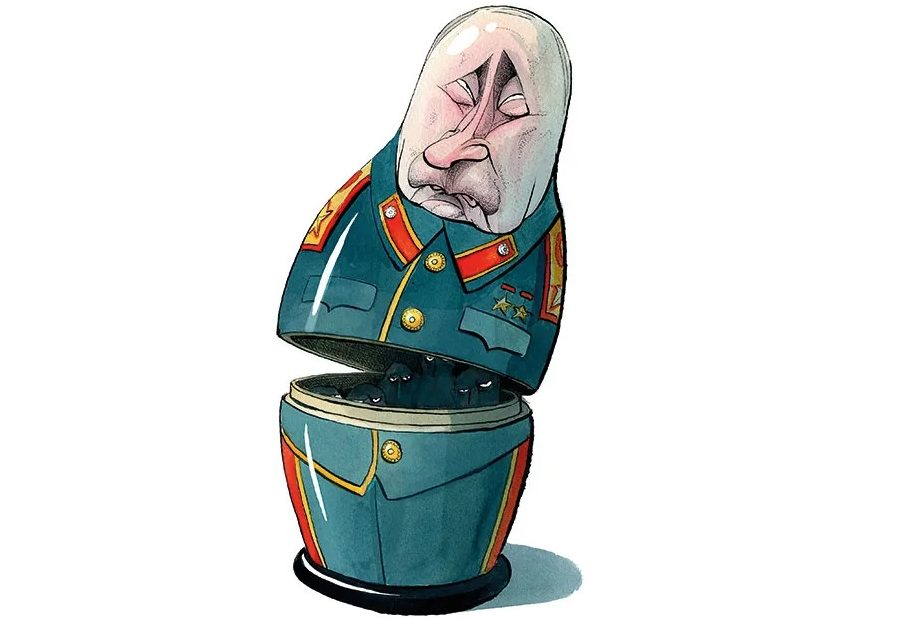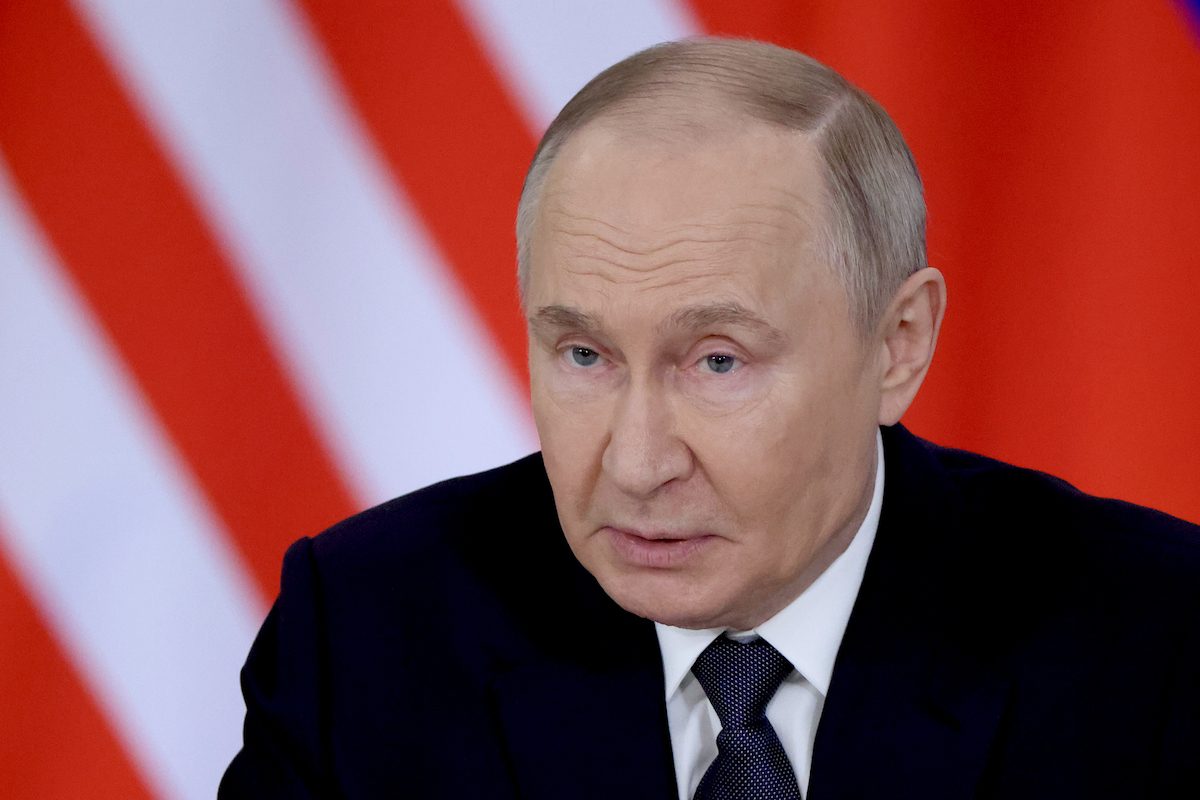How old will you be when Vladimir Putin’s next presidential term ends in 2030? Which of today’s world leaders will still be in office? By that time Putin will have been in power for twenty-nine years, and just under half the population of the Earth at that time will have been born during his reign. On current form, Putin is set to see in at least two more US presidents — or more, if he chooses to stay in power until 2036.
Putin has made a fetish of defending a Russian national sovereignty that no one had attempted to destroy
When Putin launched his invasion of Ukraine in 2022 many dared to hope that defeat on the battlefield would force Russians to finally accept that they are no longer a great global superpower and confront their imperialist assumptions. Two years in, and neither the Russian military nor its economy shows any sign of imminent collapse. On the contrary, Putin appears confident, cheerful and even cocky. The depressing reality, as Russia prepares for an election next week that will certainly see him returned for a new six-year-term, is that Putin is not going anywhere. Neither is the Russia that he created.
And yet, as he prepares for his fifth term, the truth is that Putin is a hollow czar. He invaded Ukraine to assert Russia’s greatness in its backyard as well as on the international stage. Instead, the war showed that Putin’s much-vaunted army is incapable of defeating a far smaller Ukrainian force. Instead of halting NATO expansion, he has massively extended it to formerly neutral Sweden and Finland. The invasion has erased key sectors of the Russian economy (notably gas exports and automotives), brought foreign investment to an abrupt halt and made Russia an economic vassal of China.
The war has forced up to a million of the country’s best educated and brightest into exile and broken the Kremlin’s implicit contract with Russia’s elites that they would be able to enrich themselves and enjoy their earnings unhindered in exchange for political submission. Most fatefully, war has allowed Putin and the elderly securocrats who surround him to fulfil a dream that many old men may aspire to but very few achieve — to create a future that reflects an idealized version of their country’s past.
Late-Putinist Russia is more typical of the mid-twentieth century than the twenty-first. Putin has made a fetish of defending a Russian national sovereignty that no one, in fact, had ever attempted to destroy. As the world moved away from empires and abandoned colonies, Putin built his power on an imperial vision of Russia that had comprehensively collapsed in 1991. And like the great dictators of the previous century, Putin has cultivated the obedience of the masses, fed them fantasies of militarism and heroic death, created a cult of the leader that conflated him with the state itself, banished any means for his own power to be challenged legitimately and equated political opposition with treason.
At the same time, paradoxically, the secret of his success as a leader has been that he is not a dictator who maintains his power solely by repression and propaganda. Rather he is, like Turkey’s Recep Tayyip Erdoğan, one of the world’s most ruthlessly successful populists. Putin’s rule has been much more based on consent than coercion. In the absence of any real alternative, polling data in Russia is not particularly meaningful. But it’s clear that despite Russia’s isolation, sanctions and more than 80,000 deaths in Ukraine, Putin still enjoys the active support of a critical mass of his people — with whom he shares a vision of Russia as a strong, powerful nation which the West is determined to destroy.
How to reconcile those contrasting realities — of a Russia palpably unable to defeat a much smaller and weaker neighbor and whose economy has been hollowed out by the war on the one hand, and on the other Putin’s remarkable political resilience and continued apparent popularity?
On the material side, the simple answer to Putin’s survival is oil. Gazprom’s exports of natural gas, which before the destruction of the Nord Stream pipeline in September 2022 accounted for 35 percent of Europe’s gas supplies and close to 25 percent of the Kremlin’s state budget, have collapsed. But exports of oil to countries willing to ignore western sanctions and price caps — notably India and China — have risen.
The political answer is that Putin has done a convincing job of persuading his people that he is defending his country from a concerted attack by the collective West and that the invasion of Ukraine is a war for national survival. In his state of the nation speech to the assembled Russian political elite last month, he denounced the “colonial practices” of the “so-called West [which] seeks to impede our progress and wants to see Russia as a dependent, declining and dying space where they can do as they please.” For good measure, Putin also rolled out his often-repeated assurance that Russia’s strategic nuclear weapons “remain on full alert.”
But the most significant part of Putin’s speech was not what he said about the war in Ukraine but how little time he devoted to it — just fifteen minutes of two hours. The rest was focused on his domestic program, addressing everything from fixing a deepening demographic crisis to replacing crumbling infrastructure, improving health and education and providing funding for science and research. The nuts and bolts, in short, of everyday administration. And his main message was aimed not at Russia’s wealth creators or elites but squarely at the budzhetniki — the tens of millions of state employees, military and security personnel, pensioners and bureaucrats who rely on the Kremlin for their income and who form the backbone of Putin’s support.
The key question for his political survival is how long he will be able to pay to keep these people onside. Few of the bullish economic forecasts that Putin made in his speech stand up to close scrutiny. Yes, Russian GDP nominally rose more than any G7 country last year. The average Russian household ended 2023 with about 18 percent more money in the bank than a year earlier. Sberbank, Russia’s largest state-controlled bank, posted a 5.5-fold year-on-year net profit jump to a record high of $16.3 billion. The defense industry employs 3.5 million people and many factories have doubled their workforce since the beginning of the war. But this apparent economic boom is really due to a massive increase of state spending on the war — a form of military Keynesianism that is swallowing 40 percent of the state budget and close to 10 percent of Russia’s GDP.
Like Brezhnev’s Soviet Union, Russia is no longer a place where its brightest and best can see a future
Russia’s Central Bank claims that the boom is due to “increased economic activity and growth in real wages.” But look closer at the statistics on Russians’ swelling bank balances for instance, as the Finnish research institute BOFIT has done, and it emerges that the regions with the biggest rises in bank deposits are among the poorest in Russia — places like Tuva, Buryatia and the Altai Republic, where between 20 and 33 percent of the population live below the poverty line.
It’s these depressed regions which provide the bulk of Russian soldiers fighting in Ukraine on generous contracts — and receiving compensation of $68,800 for every soldier killed in action. At the same time the Russian government is, for the first time in years, running a budget deficit that has drawn down the liquid reserves of Russia’s national wealth fund from $143 billion in July 2022 to $56 billion (held in gold and Chinese yuan) at the end of 2023. At the current burn rate of $4.4 billion a month, those reserves will be gone in little over a year. Small wonder that the governor of the Russian central bank, Elvira Nabiullina, sat through Putin’s speech dressed in black and looking miserable.
Exactly how the Ukraine War will end and on what terms remains unclear. But the Russian ministry of finance, for its part, assumes in its budget forecasting that military expenditure will fall significantly in 2025. That would represent a peace — or at least a stalemate — dividend that should release more money to pay for Putin’s rosy promises to his electorate. But with foreign investment dead in the water, whole sectors of the economy decimated and western sanctions unlikely to be lifted for some time, it’s a mystery how the Kremlin expects the Russian economy to reset to its pre-war shape.
With Russia still on the offensive in the Donbas, and western — particularly US — military support for Kyiv wavering, it seems increasingly likely that Putin will emerge from the war in control of some and maybe all of the 18 percent of Ukraine that he has so bloodily seized. He will undoubtedly cast that as a kind of victory.
But even after the guns go quiet, “war will remain the organizing principle of late-Putinist Russia,” says Professor Mark Galeotti of the UCL School of Slavonic and East European Studies. Putin doesn’t need a shooting war in Ukraine to maintain the illusion that he is still fighting the collective West. Yet an imaginary forever war is hardly a strong or sustainable basis on which to build a regime. With enterprise and investment dead, and cut off economically, diplomatically and culturally from the West, Russia has been reduced to reliance on exports of oil, fertilizer and agricultural goods. Like Brezhnev’s Soviet Union, Russia is no longer a place where its brightest and best can see a future for themselves.
Putin has managed to negotiate the political and economic storms of war, finding work-arounds to counter sanctions and defusing the political fallout of thousands of body bags, with remarkable skill. He is justified in feeling smug. But his regime’s survival has come at the cost of hollowing out Russia’s future, crushing the hope of change.
This article was originally published in The Spectator’s UK magazine. Subscribe to the World edition here.


























Leave a Reply